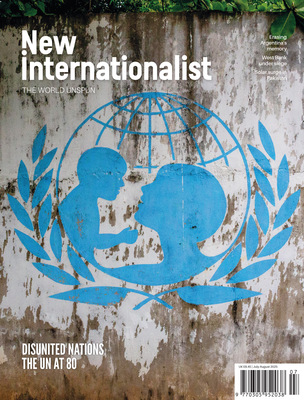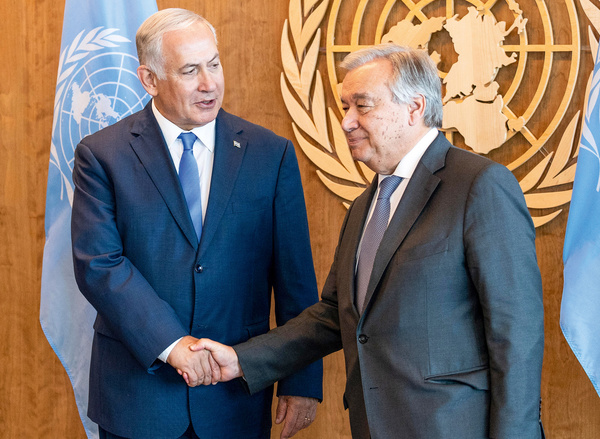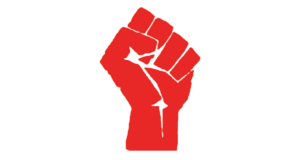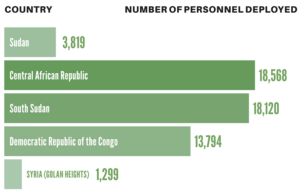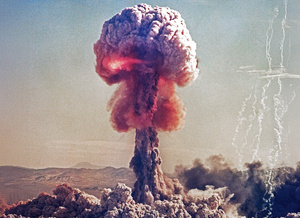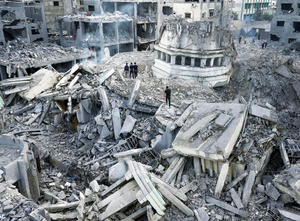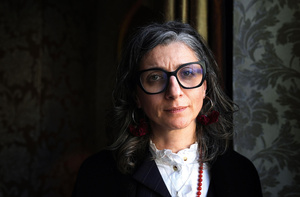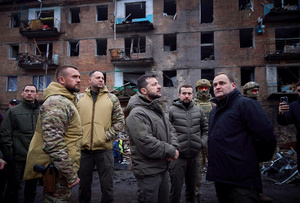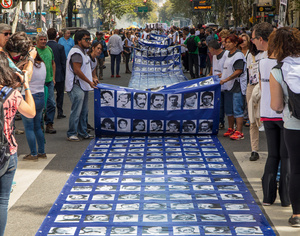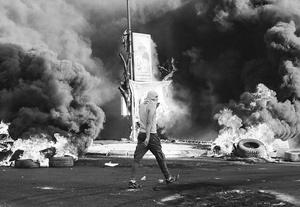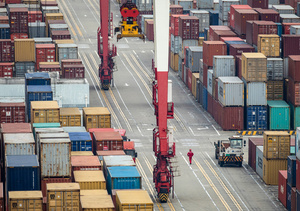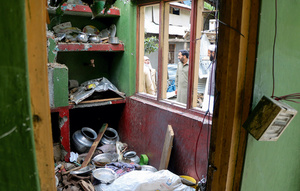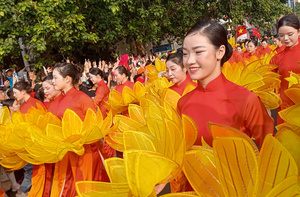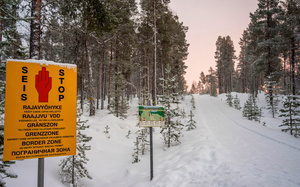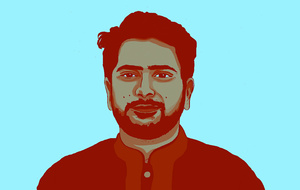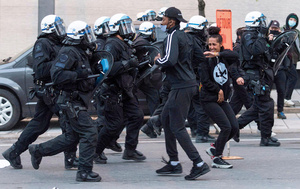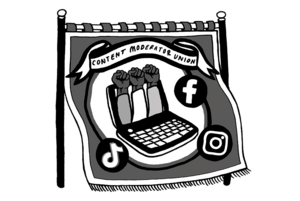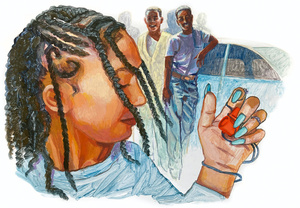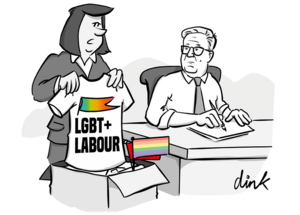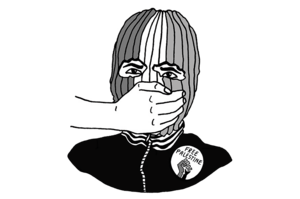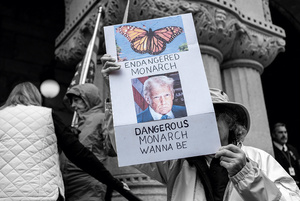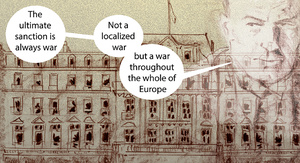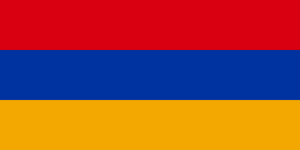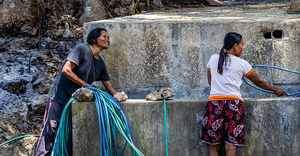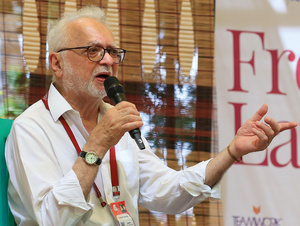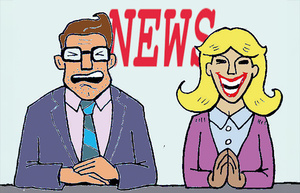United Nations at 80
A note from the editor

Dis-United Nations
26 June marks the 80th anniversary of the UN Charter. Yet given devastating wars in Palestine, Ukraine, Sudan and elsewhere, celebrations are likely to be muted.
The group of countries that formed the UN – a smaller group than today, for much of the world was still colonized – did so from the ashes of World War Two, and the League of Nations that failed to prevent it. At the 1945 founding conference in San Francisco, while world leaders expressed their sombre and heartfelt reflections and aspirations for the UN, a military intelligence team just a few miles down the road was decoding cables between delegates and their home countries to feed back to the US State Department.
The UN, according to historian Stephen C. Schlesinger, was ‘from the beginning a project of the United States’. While it undoubtedly reinforces the hegemony of the US and its allies, the UN not only remains an arena of struggle, but also offers an opportunity to build a roadmap for global justice.
The formation of the Hague Group earlier this year was not for nothing. It’s made up of nine Global South countries campaigning for the enforcement of international law – and court adjudications – against Israel, ‘guided by the purposes and principles enshrined in the Charter of the United Nations’. Many of these principles are the right ones, so how can we direct them with the purpose they were always denied?
Elsewhere in this issue, Kasturi Chakraborty reports from the West Bank and Richard Swift offers highlights from Toronto’s Hot Docs festival.
Conrad Landin for the New Internationalist co-operative.
www.newint.org
The big story
Israeli Prime Minister Benjamin Netanyahu meets Secretary-General Antonio Guterres at UN headquarters. While the UN General Assembly has consistently condemned Israel, the all-powerful Security Council has blocked international action.
Photo: Sopa/Alamy
Global leadership vetoed
556 - July, 2025
The modern failures of the United Nations are not an aberration – but a product of its imperial roots, argues Conrad Landin. So how can we create a functioning system for global co-operation?
The Big Story
United Nations - The Facts
556 - July, 2025
Components, budget, and the peacekeepers of the United Nations.
Fork in the road
556 - July, 2025
In March, a UN conference sought to make progress towards outlawing nuclear weapons for good. But how can it make a difference while the world’s nuclear powers ignore it? Xander Elliards reports from New York.
Fiddling while Gaza burns
556 - July, 2025
Having facilitated Israel’s settler-colonial project, the UN is now helpless to pick up the pieces. By Hamza Yusuf.
‘The smears make me stronger’
556 - July, 2025
Francesca Albanese has stepped out of the United Nations’ structures to speak directly to the world’s people about the ongoing genocide in Palestine. Bethany Rielly meets her.
Trading rhetoric
556 - July, 2025
The war in Ukraine has thrown the UN’s weaknesses and contradictions into sharp relief, argues Lily Lynch.
A past denied
556 - July, 2025
To confront the atrocities of its military dictatorship, Argentina introduced a range of lauded ‘memory and justice’ policies. Now the Javier Milei government is stoking denial of the past and undermining families’ fights for justice. Ali Qassim reports.
Under the eye of occupation
556 - July, 2025
The Jenin refugee camp has long been branded a ‘capital of resistance’ for Palestinians in the West Bank, but it has paid a price. Kasturi Chakraborty reports on the impacts of Israel’s latest siege and life under surveillance.
Britain’s undeclared war on Yemen
556 - July, 2025
Ruth Rohde and Jack Cinamon explain how the US and Britain went from selling bombs for use against Yemen to dropping them themselves.
Comment
As the world changes
556 - July, 2025
The Global South is rapidly reducing its reliance on old imperial powers. Vijay Prashad argues this presents an unprecedented opportunity to refashion economies and societies for good.
Currents
Fear lingers
556 - July, 2025
Kashmiris pay the price while Delhi and Islamabad posture for power, by Adil Hussain and Adil Hussain .
En route
556 - July, 2025
Kolkata’s century-old trams battle property tycoons and political apathy to stay in motion, by Ritwika Mitra.
Attack on aid
556 - July, 2025
Gaza aid ship blasted as Israel extends its siege beyond the shoreline, by Paula Lacey.
Briefly
556 - July, 2025
Starbucks’ slaves; Canal clash; Tracking a crackdown; Deeper dictatorship; Long legacy; Royal negligence.
Lethal exports
556 - July, 2025
US gun pipeline fuels Haiti’s gangs while Washington looks away, by Steve Shaw.
Rewarding bullies
556 - July, 2025
Starmer courts Trump at the expense of UK rights and digital protections, by Anita Bhadani.
Celebrations clouded by toxic legacy
556 - July, 2025
Vietnam’s jubilee parades clash with the lingering poisons of war, by Tom Fawthrop.
Frozen out
556 - July, 2025
Finland’s cold-border law chills asylum rights and gives Europe a hard new line, by Bethany Rielly.
Introducing... Muhammad Nahid Islam
556 - July, 2025
The Bangladeshi student activist-turned-politician, by Richard Swift.
Brutal Force
556 - July, 2025
Twin police shootings expose Canada’s hidden crisis of racialized violence, by Changiz M Varzi.
Old Foes
556 - July, 2025
Ethiopia and Eritrea reignite rivalry, turning the famine-struck north into a proxy front, by Samuel Getachew.
Regulars
My whistle, my voice
556 - July, 2025
A bold feminist campaign turned a whistle into a protest against street harassment. Maya Misikir tells their story.
Open Window
556 - July, 2025
'Sir Keir Starmer changes his mind on Transgender issues' by Chris Williams (UK)
Cartoon History: The League of Nations
556 - July, 2025
ILYA charts the rise – and demise – of the UN’s predecessor organization – and shows how entrenching Western power is a recipe for failure.
Southern Exposure: Garry Lotulung
556 - July, 2025
Highlighting the work of artists and photographers from the Majority World.
‘Don’t believe everything on TikTok’
556 - July, 2025
Writer, activist and former British Black Panther Farrukh Dhondy reflects with Subi Shah on his inspirations and what we can learn from the current state of world politics.
Temperature Check
556 - July, 2025
A shining example. What can we learn from Pakistan’s unexpected solar surge? Words by Danny Chivers
Agony Uncle: Mental health crisis
556 - July, 2025
Struggling with an ethical dilemma? New Internationalist’s Agony Uncle can help you find answers in our troubled political times.
Film, Book & Music Reviews
Books Essay: Floating work sites
556 - July, 2025
A social historian interrogates racialized capitalism amid the mysteries of the steamship. By Michael Muir.
Spotlight: DJ Ritu
556 - July, 2025
Ritu Khurana - aka DJ Ritu - cult DJ who co-founded Kuch Kuch Nights and LGBTQ+ Club Kali. Words by Subi Shah
